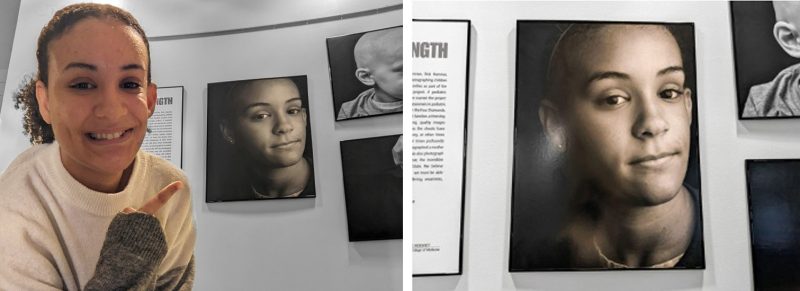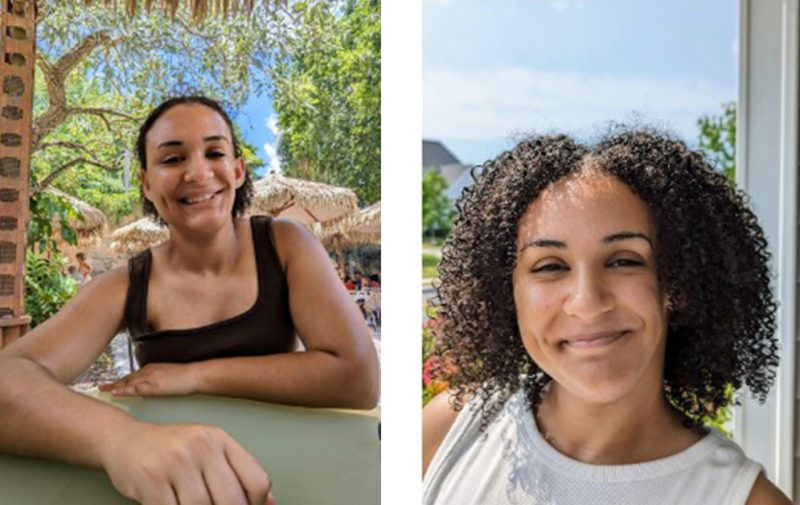Developing Strength During Cancer
Four Diamonds young adult Monica was diagnosed with alveolar rhabdomyosarcoma at the age of two. A soft-tissue tumor was growing in her cheek, despite other providers misdiagnosing it twice. At the time, there were no standard treatment plans, so her cancer journey took her to four different specialty hospitals, as well as Harvard University for a clinical trial involving high-dose radiation therapy for a month straight. Monica was declared NED (No Evidence of Disease) when she was four years old and officially cancer-free by the time she was nine. She transitioned to yearly survivorship care at Penn State Health Children’s Hospital and Four Diamonds shortly after.

Post-treatment, Monica experienced times of psychological distress, hypersensitivity and emotional outbursts, which she eventually understood to be a form of complex post-traumatic stress disorder (C-PTSD) due to her cancer treatments. As she entered her middle school and high school years, she began experiencing the long-term effects of treatment including pain and chronic conditions, and doctor visits became a regular occurrence.
Finding Strength In Sharing Her Cancer Journey
What Monica came to realize eventually was that sharing her journey was essential to coping with her mental conflict and adversity. Monica’s mission to share her cancer journey led her to leading a Four Diamonds Mini-THON event and publicly sharing her story for the first time. It also led her to run from San Francisco to New York City (4,000 miles) at the age of nineteen. She ran with a team of individuals who created a safe space to express the pain, anger and beauty that comes with cancer. It taught Monica to feel pride in her survivorship story, accept vulnerability and lean on the power of others who understand her.
“It’s quite hard to articulate my survivorship experience verbally,” says Monica. “Written words aren’t much easier, and I owe that to the fact that my relationship with childhood cancer is ongoing. Cancer has been more of a ‘chronic’ experience for me mentally and physically. I’m still fighting–and healing. My feelings exist in plurality, which I think is a healthy response to living with a trauma history. I feel beauty and tragedy. Strength and pain. Rage and hopefulness.”
Monica is proud of where she is and recognizes that she was given an unfair fight. A constant state of healthiness was out of the question once her tumor appeared. Although she is years out of active treatment, she still manages late-term effects of both chemotherapy and radiation. “I’m longing for the day when survivors don’t just survive but are also given the chance to thrive,” says Monica.
Now a 24-year-old young professional, Monica has a master’s degree and is an awardee and speaker in health justice work. She balances prioritizing her health, advocating for cancer reform and proudly building a career for herself. She seeks to create more spaces for adult survivors of childhood cancer and spearhead initiatives to provide better support and visibility throughout one’s survivorship journey.
Strong Advice to Cancer Survivors of All Ages
Monica says, “To my fellow survivors (including current fighters and families), I’m proud of you. And I don’t mean that you are ‘so strong’ or ‘so resilient’ because you might be tired of hearing that. What I mean is that you had no choice but to be stronger than most at your age, and you are still finding a way to move forward. It’s okay if you sense your feelings are out of control, you are hyper-sensitive or you are struggling to feel at all. Your body is responding to something stressful, and I hope you are afforded the patience and space to process. It’s okay if the word ‘cancer’ makes you uncomfortable. It’s okay if there are days you despise your appearance or are ashamed of your scars. You aren’t the only one who wonders why you survived and if you were worthy enough to. And it’s okay to mourn who you could have been and what your future might look like without a cancer history. BUT most importantly, don’t avoid your reflection. You made it too far for that. You don’t have to share your story with anyone, but don’t keep your truth from yourself. You are more than cancer so define the life you see for yourself. And don’t doubt yourself. You know what you need and what you deserve. I can’t guarantee that things get easier as you grow because cancer isn’t easy. But you’ll learn to walk in stride with it and there’s a community of survivors here to support you.”
To learn more about childhood cancer, visit our website at: www.fourdiamonds.org/about-childhood-cancer/


